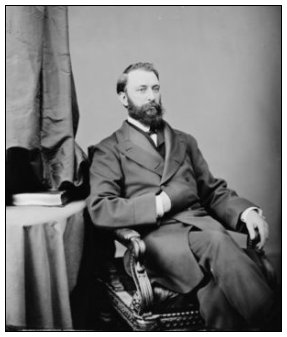Colonel William Farrand Prosser
The first people of this area were the Yakamas, Umatillas, Klickitats, and Wallulas. They fished for salmon, and steelhead in the Yakima, Snake, and Columbia Rivers. They hunted elk and deer in the hills and gathered seeds and berries. In the fall they would travel to the slopes of the Cascade Mountains to gather huckleberries around, both Mt. Rainier and Mt. St. Helens. There was even trade with the coastal first peoples.
In 1850, by the prodding of Senator Thomas Hart Benton of Missouri, the United States Congress passed the Donation Land Act, which granted farmlands to settlers. In 1862 Senator Benton was the father of the Homestead Act.
The Founding of Prosser
Colonel William F. Prosser from Pennsylvania founded the town. Col. Prosser was a schoolteacher and former surveyor. He was also a land agent when he and his wife, Flora, moved to the Yakima Valley in 1882. They homesteaded here and opened a trading post. Farrand Park on the riverfront  marks the site of their home. Even though they did not stay long, their time there was enough for the people to name their town after him.
marks the site of their home. Even though they did not stay long, their time there was enough for the people to name their town after him.
Prosser started out, like so many frontier towns, as a farming community. There were cattle ranches and herds of sheep that wintered in the mild winters of the valley. Cowboys would bring their herds down to the Yakima River to be watered and they would haul barrels of water back to their ranches or farms.
Before irrigation arrived the farms were dry land farms and did not require a lot of water. The residents of Prosser built a flour mill in 1887 so that they could process their wheat into flour instead of having to haul it someplace else. Lewis Hinzerling, another early settler, was one of the people behind the building of the mill and the 6th Street Bridge. The grist mill was built at Prosser Falls, a traditional fishing station for the Yakima Native Americans. In 1906 a train carried some of this flour to San Francisco to help the residents there after the earthquake.
Irrigation and the Railroad
In 1893 irrigation finally came to the Prosser area giving the farmers more options for the crops they grew. Some of the first were eggplant, sugar beets, strawberries, corn, apples, and other fruit. Prosser was incorporated in 1899.
The coming of the railroad to Prosser opened other opportunities for shipping their crops and livestock to markets in other cities. One of the industries that took advantage of the railroads was ice-making.
The railroad also allowed the people of this area to travel to sporting events, conventions, and other excursions. For most of the people here never went anywhere beyond their local community and the railroad gave them the freedom to travel, but it also brought the outside world to them.
Prosser’s Growth
When the year 1900 arrived, it found the town of Prosser with a population of 220 and there were numerous real estate offices. banks and a mercantile open to serve the growing number of farmers that were moving into the area. In 1905 Prosser became the county seat for Benton County. That same year the Prosser Queen riverboat was launched to originally haul freight and passengers and later was used for Sunday outings.
In 1910 electricity and the telephone came to town. In the 1920’s the three local newspapers combined to become the Record-Bulletin, which is still being published today.
The post-World War II prosperity arrived in Prosser. In 1950 a wealthy farmer and WW II veteran donated the money to build a community center and in 1957 a community pool was built. In 1968 the Benton County Historical Museum was dedicated.
As in the past, Prosser’s economic base is still agriculture and is expanding into the tourism industry because of the increase in the growing of wine grapes and the numerous wineries opening up in the area.
